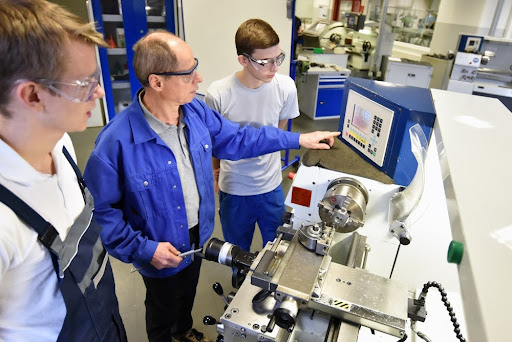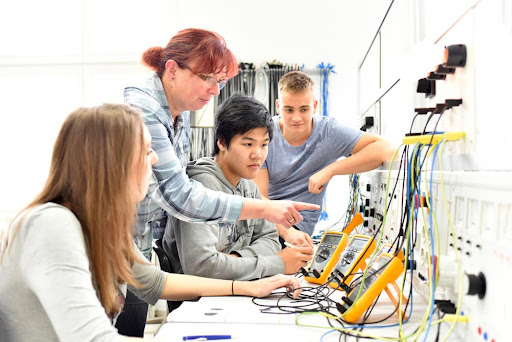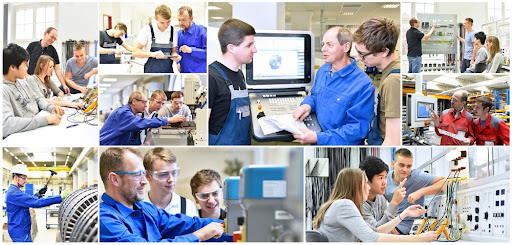
Career and Technical Education (CTE) is essential in preparing students for the workforce as it provides them with practical skills and real-world experience. While traditional education places emphasis on theoretical knowledge, CTE programs give students hands-on training that develops career confidence and readiness. Through this blog, we will see how CTE builds career confidence among students and readies them for a prosperous future.
What is Career and Technical Education (CTE)?

Career and Technical Education (CTE) is a specialized type of education that combines academic learning with technical and career-oriented skills. It encompasses many industries, such as healthcare, information technology, business, engineering, and others. CTE courses are planned to fill the gap between academic learning and the needs of the workforce, making students proficient in practical skills and industry-specific knowledge.
Recommended Reading: The Power of STEM Education in Shaping the Future
How CTE Builds Career Confidence in Students

1. Hands-On Learning and Real-World Experience
One of the greatest advantages of CTE is that it focuses on experiential learning. Students take up hands-on projects, internships, and laboratory-based activities that mirror actual working conditions. This form of experiential learning assists them in building confidence in themselves and readying them to meet challenges in their professional fields.
2. Industry- Approved Certifications
CTE courses frequently provide industry-standard certifications, which improve the resumes of students and make them more employable. Certifications show a student‘s proficiency in a particular field, and hence they become more desirable to employers and more confident while entering the job market.
3. Career Pathway Exposure
CTE programs expose students to multiple career options, allowing them to try out different careers before specializing in a particular career. This initial exploration of careers helps them make educated choices, lessening uncertainty and enhancing confidence in their career choice.
4. Skill Development and Workforce Readiness
Through CTE, students learn technical and soft skills like problem-solving, teamwork, communication, and leadership. Employers highly value these skills, and they provide students with a competitive advantage in the workforce, making them more confident and career-ready.
5. Personalized Learning and Mentorship
Most CTE programs provide tailored learning experiences, such as mentoring from career experts. Expert guidance by mentors offers students insight, advice, and support, assisting them to choose a successful career with confidence.
6. Opportunities for Early Employment
CTE programs frequently incorporate work-based learning experiences, including apprenticeships and internships, through which students can develop on-the-job skills prior to graduation. This exposure assists them in developing professional contacts, increasing their confidence in their abilities, and smoothly transitioning into permanent employment.
7. Greater Earning Power
By gaining industry-specific skills and qualifications, CTE graduates are frequently eligible for better-paying jobs upon graduation. This economic independence enhances their self-esteem and motivates them to keep building their careers.
8. Entrepreneurial Spirit Support
CTE courses support entrepreneurship and innovation by instructing students in business planning, finance, and market research. With this knowledge, they are able to establish their own businesses, which further enhances their self-esteem and job satisfaction.
Recommended Reading: Innovation in Education: Exploring Alternative Grading Systems
9. Employer and Industry Partner Collaboration
Most CTE programs partner with industry leaders and employers to make the curriculum relevant. Students are exposed to working on actual industry projects and gaining insights from professionals, providing them with a clear picture of industry expectations and increasing their confidence.
10. Flexibility to Evolving Job Market Trends
CTE programs change according to the requirements of the industry and changing job trends. This helps ensure that students are continuously acquiring the latest skills, hence having greater confidence in their capacity to handle a changing job market.
11. Growth of Critical Thinking and Problem-Solving Skills
CTE classes focus on problem-solving and critical thinking, which are valuable skills in any profession. Through real-world projects, students learn to analyze problems, think creatively, and create solutions that work, building their confidence in solving challenges in the workplace.
12. Teamwork and Leadership Training
Most CTE programs emphasize group projects and teamwork, and students learn teamwork and leadership competencies. These are exposures that prepare them for the working environment where communication and collaboration are essential, and they will feel confident leading and working in a team.
Recommended Reading: Learning Reimagined: How Alternative Education is Shaping the Future
Conclusion
Career and Technical Education is an effective vehicle for building career confidence among students. Through hands-on education, industry certifications, career awareness, and skill development, CTE gives students the confidence and skills to thrive in today’s workforce. With the need for skilled workers increasing, an investment in CTE can be a game-changer for students looking for a solid foundation in their careers.
Moonpreneur is dedicated to transforming conventional education, preparing the next generation with comprehensive learning experiences. Our Innovator Program equips students with vital skills in AI/ML, Robotics, Coding, Game Development, and App Development, fostering entrepreneurship through hands-on learning. This initiative aims to cultivate the workforce of tomorrow by integrating innovative technologies and practical skills in school curriculums.
Register for a 60-minute free workshop today!

























